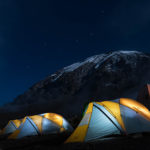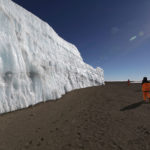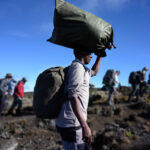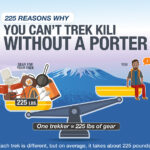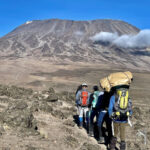We know our trekkers are passionate about the environment; without healthy wild spaces, they wouldn’t be able to enjoy one of their favorite activities (at least not as much)!
Keeping the environment healthy, here and in Tanzania, is something we see as both a passion and a responsibility. In honor of Earth Month, we wanted to point out some of the ways we’re making your Kili trek green (even once you pass out of the rainforest). Thanks to these measures, you can rest assured that your dream of reaching the summit isn’t harming the fragile environments you love so much:
Solar Power
We’re all aware that where we get our energy matters, which is why we’ve opted to use the original green energy source to power our treks: the sun.
On the mountain, there’s no electricity, but the LED lights in your dining tent are solar-powered (since batteries are potentially-damaging waste products). That’s not the only place we’re opting for greener energy: Thomson’s Watertown office currently gets 33% of its energy needs from a solar array we installed on the roof (the largest solar array in the entire city!).

For every kilowatt of power capacity converted from fossil fuels to solar power, almost a ton of greenhouse gases are kept out of the environment
“US Navy 111022-N-OH262-322 A view of solar panels being installed at Naval Station Guantanamo Bay, Cuba” by U.S. Navy photo by Chief Mass Communication Specialist Bill Mesta – This Image was released by the United States Navy with the ID 111022-N-OH262-322 (next).This tag does not indicate the copyright status of the attached work. A normal copyright tag is still required. See Commons:Licensing for more information.বাংলা | Deutsch | English | español | euskara | فارسی | français | italiano | 日本語 | 한국어 | македонски | മലയാളം | Plattdüütsch | Nederlands | polski | português | Türkçe | 中文 | 中文(简体) | +/−. Licensed under Public Domain via Wikimedia Commons – http://commons.wikimedia.org/wiki/File:US_Navy_111022-N-OH262-322_A_view_of_solar_panels_being_installed_at_Naval_Station_Guantanamo_Bay,_Cuba.jpg#mediaviewer/File:US_Navy_111022-N-OH262-322_A_view_of_solar_panels_being_installed_at_Naval_Station_Guantanamo_Bay,_Cuba.jpg
Local, Organic Food
On the mountain, trekkers enjoy fresh fruits and vegetables the whole way up. But did you know they’re grown HYPER-locally…at the Arusha trekking offices?
Not only is the garden organic, it’s extremely local (which means emissions related to transporting the food are minimal).
And don’t worry if you can’t enjoy every last bite: food waste on the mountain is composted, eventually restoring the nutrients in the garden’s soil.

Producing food with fewer chemicals keeps toxic substances out of the human body, and buying food locally helps reduce fossil fuel consumption, sometimes drastically
“Produce Rainbow” by Flikr user Moon Angel licensed under CC BY-SA 2.0
Fuel Recycling
It’s impossible to get around the bumpy roads and vast stretches of wilderness in Tanzania without heavy-duty vehicles, and keeping those vehicles in good repair means regular maintenance.
That means a lot of leftover oil.
Fortunately, we came up with a great way for the safari vehicles to do double-duty: cooks in the Arusha offices use recycled oil to fuel the ovens where your breads and baked goods are cooked.

One gallon of motor oil dumped into waterways has the potential to pollute one million gallons of water
Photo: Thomson Safaris guest, Mary McKay
Removing Everyone’s Waste
Your porters are incredibly hard-working, and they adhere to Leave no Trace ethics rigorously.
But not every outfitter on the mountain is so conscientious, a fact which has contributed to significant trash problems on Kili over the years.
We want to do our part to leave Kili BETTER than we found it; that’s why Rick and Judi (owners of both Thomson Safaris and the Tanzanian operations) pay Tanzanian staff members bonuses for every kilo of trash they bring down off the mountain!

Last year, paying bonuses for trash removal brought down over 400 lb of waste from the mountain
“Kalalau Trail, Kauai” by Rick McCharles licensed under CC BY 2.0
Recycling
In the West, we take recycling for granted, but in East Africa, recycling programs are still essentially nonexistent.
Or they were; recently, the Arusha trekking offices helped launch a pilot recycling program in the Arusha area. They’ll be collecting not only all the plastic water bottles from Thomson treks and safaris, but plastic waste from local residents looking to recycle. We’re proud to be on the front-line of this important program!

The US uses 1500 plastic water bottles PER SECOND (i.e., 129.6 million every day)
We’d love to hear what you’re doing to live greener—please tell us in the comments section!

